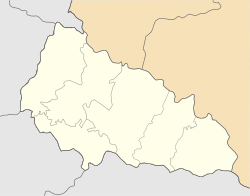Svaliava
Svaliava
Свалява | |
|---|---|
 View of Svaliava | |
| Coordinates: 48°32′50″N 22°59′10″E / 48.54722°N 22.98611°E | |
| Country | |
| Oblast | Zakarpattia Oblast |
| Raion | Mukachevo Raion |
| Hromada | Svaliava urban hromada |
| Founded | 12th century |
| Incorporated | 1957 |
| Government | |
| • Mayor | Ivan Lanyo |
| Population (2022) | |
• Total | 17,068 |
| Time zone | UTC+1 (CET) |
| • Summer (DST) | UTC+2 (CEST) |
| Postal code | 89300 |
| Area code | +380-3133 |
| Climate | Dfb |
| Website | http://www.svalyava.org/ |
Svaliava (Ukrainian: Свалява, IPA: [swɐˈlʲɑwɐ] ⓘ) is a city located on the Latorytsia River in Zakarpattia Oblast in western Ukraine. It was the administrative center of the former Svaliava Raion (district) until its abolition in 2020, now it is located in Mukachevo Raion. Population: 17,068 (2022 estimate).[1]
Etymology
[edit]Due to the city's complex history, there are also alternative names for it in other languages, including:
- Rusyn: Свалява, romanized: Svaliava;
- Hungarian: Szolyva;
- Slovak: Svaľava;
- Czech: Svaljava;
- German: Schwalbach, Schwallbach;
- Romanian: Svaliava;
- Russian: Свалява, romanized: Svalyava;
- Yiddish: סוואליאווע, romanized: Svalyave.
Although the name of the city is similar to the Gothic swaljawa meaning "swallow", the etymology of the name Svalyava comes from the Slavic roots Zolva, Solyava, Solva, meaning "salt". Its origin dates back to ancient times, when salt from the Marmaros County was transported to neighboring regions.[2]
Demographics
[edit]The 2001 census officially identified more than 94% of the population.[3]
- Ukrainians 94.5%
- Russians 1.5%
- Hungarians 0.7%
- Slovaks 0.6%
History
[edit]Swaljawa was first mentioned in the 12th century as a small settlement of a Hungarian feudal lord. In the 18th century, the village was annexed to the Austro-Hungarian Monarchy and was called Schwalbach. These lands later passed to the Count of Schönborn and his descendants. Gradually, Swaljawa became a multinational town with a significant part of the population being ethnic Germans.[4]
According to the census of 1910, 47.1% of the population was Greek Catholic, 26.2% Jewish and 22.9% Roman Catholic. The Jewish population was deported to Auschwitz after the German occupation of Hungary, in May 1944, and most of them was murdered there.
After the Second World War a concentration camp was working near the town. Hungarian and German-born civilians (born between 1896, and 1926) were carried off by Soviet forces to the camp purely on the basis of their nationality. They were ordered to report for "malenkij robot" (a corrupted Russian for "small work"), but most of them – more than 20 thousand deportees were killed in the deathcamp after being subjected to various tortures (no water for days, glass powder mixed into their food). A further 50 000, or so Hungarians (not only men, but also women and children) were deported from Szolyva to the Soviet Union or Galicia. They were later exterminated.[5] The site of the camp is now a memorial park established in 1994.[6]
Gallery
[edit]-
St. Nicholas Church
-
Synagogue in Svaliava
-
Former synagogue, now a bakery
-
Former synagogue
-
Jewish cemetery
-
Memorial park
References
[edit]- ^ Чисельність наявного населення України на 1 січня 2022 [Number of Present Population of Ukraine, as of January 1, 2022] (PDF) (in Ukrainian and English). Kyiv: State Statistics Service of Ukraine. Archived (PDF) from the original on 4 July 2022.
- ^ Янко М.Т. (1998). Топонімічний словник України: словник-довідник.
- ^ "Всеукраїнський перепис населення 2001 | English version | Results | General results of the census | National composition of population | Zakarpattia region". www.ukrcensus.gov.ua. Archived from the original on 11 September 2007. Retrieved 12 January 2022.
- ^ "Deutsche der Ukraine. Wer sind Sie?" (in German). 28 October 2020. Retrieved 2023-03-14.
- ^ "Magyar holokauszt". 3 December 2008.
- ^ "The memorial park in Svalyava town - Places of interest from a to Z, Places of interest / Places of interest". Archived from the original on 2016-03-04. Retrieved 2014-10-24.
External links
[edit]- Svaliava in the Encyclopedia of Ukraine










